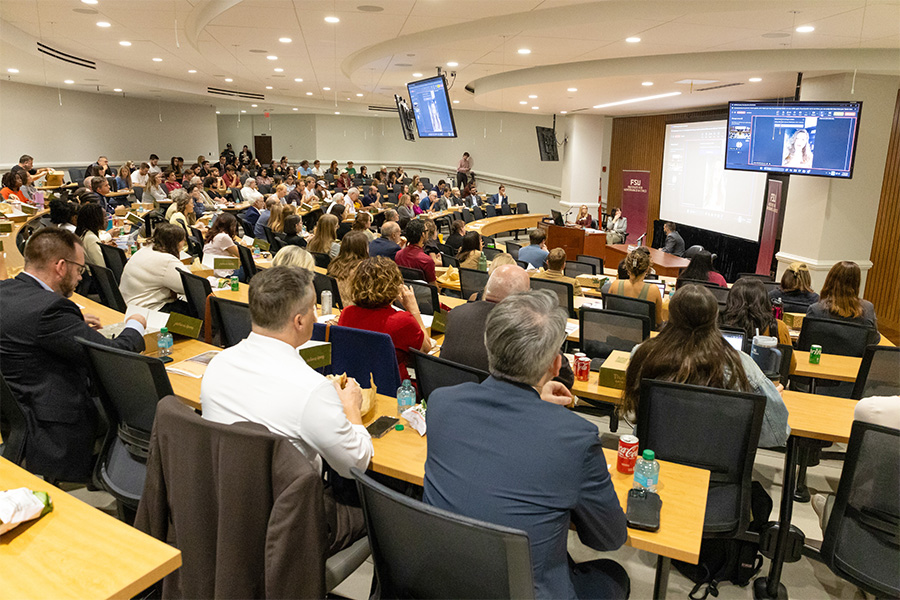
A new initiative at Florida State University’s College of Law is bringing timely constitutional debates into the classroom through immersive, real-world experiences.
The new First Amendment Clinic, in partnership with the Florida Institute for Governance & Civics, hosted its inaugural event, “SCOTUS Preview: Free Speech on the Docket,” to a packed audience of former Florida Supreme Court Justices, community members, FSU faculty, alumni and students.
Launching in spring 2026, the first clinic of its kind in Florida will offer students hands-on opportunities to advocate for individuals and organizations whose rights to free speech, religious liberty, association, assembly or free press are at risk. The event reflected the clinic’s mission to bring pressing constitutional debates directly into the College of Law curriculum, where students will learn from nationally respected advocates while gaining practical experience on issues at the core of American democracy.
“By positioning the First Amendment Clinic as a hub for dialogue on fundamental freedoms, we are expanding the reach of our curriculum beyond the classroom,” said Erin O’Hara O’Connor, dean of the FSU College of Law. “The clinic will no doubt be strengthened by our nationally recognized constitutional law program, ranked No. 16 by U.S. News & World Report.”
“By positioning the First Amendment Clinic as a hub for dialogue on fundamental freedoms, we are expanding the reach of our curriculum beyond the classroom.”
– Erin O’Hara O’Connor, dean of the FSU College of Law
The program focused on two pending U.S. Supreme Court cases that test the limits of government regulation of speech and association, with results that could significantly influence the First Amendment landscape.
In First Choice Women’s Resource Centers v. Platkin, the Court will decide whether organizations may challenge state subpoenas raising First Amendment concerns directly in federal court. A New Jersey Attorney General subpoena seeks donor records and internal documents from a pregnancy resource center, which argues the demand is burdensome and chills its speech and associational rights. Lower courts required the dispute to proceed in state court, but the Supreme Court granted review to provide a resolution.
Meanwhile, Chiles v. Salazar asks whether states may prohibit licensed counselors from providing therapy to minors experiencing gender dysphoria if that therapy encourages the minor to bring their gender identity in line with their biological sex. A Colorado counselor argues the state’s ban censors her viewpoint and violates her rights under the Free Speech and Free Exercise Clauses. The Tenth Circuit upheld the law, treating it as a regulation of professional conduct rather than a restriction on speech.
The panel featured a variety of viewpoints about these cases from Professor Jane Bambauer of the University of Florida; Erin Morrow Hawley, senior counsel and vice president at Alliance Defending Freedom and counsel of record in Platkin; Michelle Kallen, former Solicitor General of Virginia and now partner at Steptoe; Cameron Norris, partner at Consovoy McCarthy in Washington, D.C., and Denise Harle, director of the FSU First Amendment Clinic, who moderated the discussion.
Panelists drew on their litigation experience to share insights and encouraged students to approach free speech issues with neutrality, to challenge their own assumptions and to consider cases from multiple constitutional perspectives.
“Our goal is to train the next generation of First Amendment advocates while creating space for the community to hear directly from leading voices on these important debates,” Harle said. “We are excited to build on this momentum and continue hosting events that bring important constitutional debates to the forefront.”
For more information about the First Amendment Clinic or to watch the event recording, visit law.fsu.edu/firstamendmentclinic.



